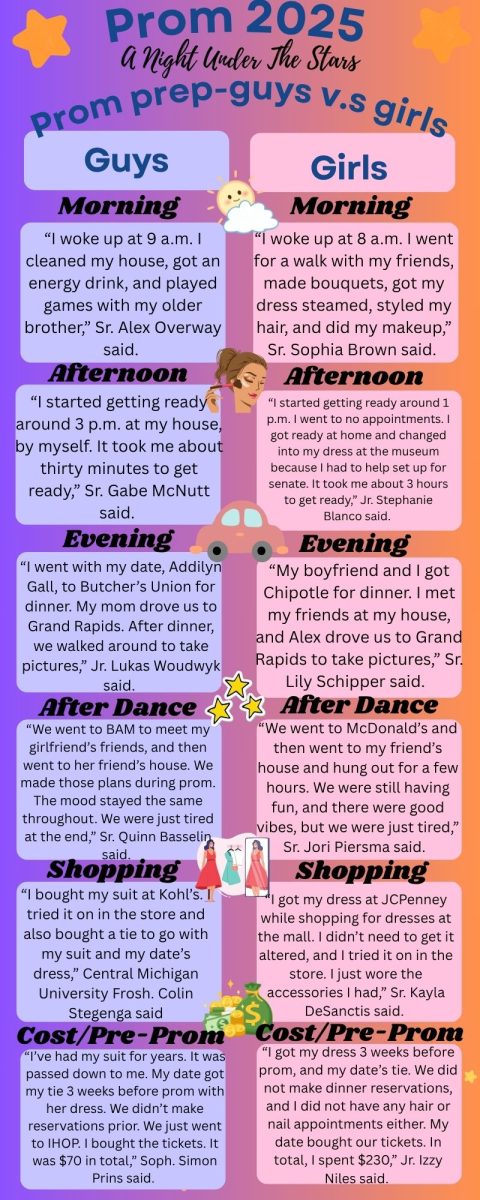“I don’t know what I’m going to do,” I said to myself as I scrolled through the WO course guide in the spring of 2017. I was trying to pick out a senior English class, but couldn’t because I wasn’t able to find enough information. When I talked with my friends, they were also struggling to pick a class. Information that describes the workload, in class activities, and special qualities would be extremely helpful to provide students with enough information to make an educated decision.
When picking which senior English class to take, it is important to know the general requirements for each class. The classes for senior English are split between categories titled Composition and Literature and Composition. The Literature and Composition classes involve reading pieces and then analyzing them through writing. The Composition classes’ main focus is writing; this makes up the majority of the in class work. There is also an informal third category for longer classes: the AP and IB English classes that count for the senior credit. While many people take one or more of these classes before their senior year, it has to be taken during the senior year to count for the credit. To receive the full senior English credit, students have to take either two Literature and Composition classes, one Composition class and one Literature and Composition or take one of the year-long AP or IB classes. Each class deviates a little from these categories to create a unique class.
American Experience is one of two senior English classes whose primary focus is on literature from a single country. The class spends a lot of in-class time reading various short stories about people in America during periods of time. Students are often required to respond to questions about these pieces to try and obtain a deeper understanding of the material. There are also writings in the class summarizing and analyzing the stories. Because most of this is done within the classroom, there is relatively little homework as long as the time spent in class is utilized well. To sum up American Experience, “It is a non stressful class where you can learn more about American history through the eyes of people in America, and if that sort of thing interests you, you should take the class,” according to Sr. Kaytlyn Houting.
British Literature is a class focused on studying British literature from all the way back to the first story in English, Beowulf, all the way into the 19th and 20th century. These stories include the Canterbury Tales, old English poems, Macbeth, short essays from 16-1800s, and Sir Arthur Conan Doyle’s Sherlock Holmes. Most of the reading is done in the classroom along with a variety of activities. Students will do small groups projects, a few formal writing pieces, creative writings, and some games. The homework for this class can be a variety of tasks, including working on readings outside of class to working on other projects or essays for the class. In this class, students are able to see how how much literature, even from a long time ago influences our day to day lives and culture. Students will notice references in television and pop culture that come from this early British literature. This class is best for someone who is planning on going to some form of college because it helps students learn to read and write at a higher level.
In Humanities, the main focus is philosophy. Students will learn throughout the course how Eastern and Western philosophies approach life, reality, and religion. A lot of the work done in class involves reading works on philosophy, completing activities, and acting out scenes from Hamlet and other plays. Outside of class, students will have the opportunity to read A Brave New World by Aldous Huxley, answer study guide questions, and write small pieces analyzing sections of readings. The multitude of viewpoints that students will read about in this class makes having open mindedness and a desire to learn important characteristics for students taking this class. This makes it an important class for any student to take as it functions as a college preparatory class and it helps prepare students for a world with varying viewpoints.
Mythology is one of the more popular senior English classes at WO because students have an affinity for fantastic stories of heroic adventure. The actual work in class might not be as fantastic as the adventures that students read, but it is still rather interesting. Most of the work in class is done through discussions about specific Greek or Roman myths and other activities. This will also be the topic for all sorts of projects. The homework in the class is minimal as most of the work is done through reading and discussion. Sr. Duncan Klemm is taking this class now and said “It is a very enjoyable class, and even if you don’t like mythology you’ll still enjoy all this class has to offer in the way of fun discussions and activities.”
Reading and Writing Workshop is one of the most unconventional senior English classes. The purpose of the class is to have the students read many genres of literature. Each genre unit, students choose their own book to read and spend a lot of time in class reading through it. The other time is spent on a short warm up at the start of class and then either a class activity or working on projects. Some of these projects focus on emulating a certain style of writing or doing creative pieces. Instead of having students complete essays, students often work on creative writing pieces and projects. This structure makes it so that there is very little homework as long as the students keep up with the work in class. This class is good for anyone is who is interested in reading or writing. You get to chose the books you read which allows you to pick pieces that suit your interests or reading level, and makes Reading and Writing Workshop a great class for anyone.
Creative Writing is one of the Composition senior English classes that is most focused on writing. In the class, students learn how to write styles of stories such as short stories, poetry, and narratives. These formats are all explored in the class and are given a chance to be submitted to writing competitions for creative writing. There is a moderate amount of homework in the class spent mostly writing these stories. A lot of the work in class is spent analyzing the writings and learning how to improve writing in each of these forms. The aforementioned writing competitions give many students a chance to earn scholarship money and get them published as award winners. This class is good for any student who loves writing and wants to try out new forms of writing.
Expository Writing and Advanced Expository Writing are on a surface level fairly similar classes. They are both focused on improving students’ writing skills through grammar, research, research evaluation, and studying sentence structures. Most of the time in the classes are spent learning and writing essays or other writing pieces. This structure leads to fairly little homework in the class as long as the students in class spend their time wisely. The main difference between normal Expository Writing and the Advanced Expository Writing is the pace of the assigned work and the time students have to work on it. This class is best for the students that want to improve their writing for when they get to college or to use on college application essays.
Journalistic Writing is one of the only English classes at WO that allows students’ writing to get published and viewed by a wide audience. In this class, students not only have to worry about making an article grammatically correct, but also interesting to readers. The work in class is spent working on articles that will be published in The West Ottawan. There is relatively little homework for the class as long as the time in class is spent wisely. “It’s a chill class, but you can’t really slack off. You have deadlines that you’ll have to meet and you have to work hard to make them,” Jr. Linus Gugino said. Luckily, there are plenty of fellow students in class that are able to help out others with editing and coming up with ideas for new articles. This continual structure of writing different articles on different subjects allows students to take the class multiple times. It still must be paired with a Literature and Composition class though to get the full senior English credit.
Advanced Broadcast Journalism is another class that has students publish work to a wider audience. Rather than through writing, this class is viewed by the audience through videos published to YouTube and the student news show WOBN. A lot of the time in class is spent editing videos, creating intros, and using after effects to create videos for broadcast journalism or WOBN. There is also sometimes work for bigger projects like the Veteran’s Day video and Senior Survivor. Most of the work in class is self driven with the student having to work on their own to meet deadlines. There is help for struggling students in the class though with the wonderful Instructor Lindsay Walcott and veteran students of the class. A student of the class, Klemm would recommend this class if “you want to achieve and put more work into enhancing your abilities in video editing and production,” and “you’re willing to put yourself into a setting where deadlines matter more than just in WOBN, where if your piece isn’t done, then there are more serious consequences, where you need to work well with others and gain skills that you very much need for the rest of your life.”
Freelance Writing is a new class and one of the more interesting classes available to students for a senior English credit. Rather than writing essays, students in this class build a portfolio of writing. This is because the focus of the class is on writing material to publish to the internet. After the class, students have the option to try and get actual freelance writing jobs such as writing product descriptions or reviews by showing their experience with their portfolio. Most of the time in class is spent building this portfolio by writing practice pieces and studying effective, real world freelance pieces. This structure leads to very little homework outside of class as long as the class time is used effectively. This class is great for those who want experience to become a freelance writer someday, or for those who want to explore their creativity through the various writings.
AP Language and AP Literature are two of the three senior English classes that are a year long. With so many similarities between them, many students struggle to choose between them. Sr. Erik Heindlmeyer had a lot to say about these classes because he was able to take both of them during his time at WO. He remarked that AP Lang and AP Lit look very similar on the surface, but are actually quite distinct from each other. AP Lang focuses primarily on learning to write better about varying topics. This is accomplished by analyzing writings in class, and with a multitude of homework like essays, vocab, and multiple choice packets in order to improve students’ ability to analyze writing and put those thoughts on paper. AP Lang is generally a large class with an average of 30 students per class. This is much greater than most AP Lit classes that have approximately 18 students. AP Lit also focuses on analyzing pieces for literary devices like themes and morals. In class a lot of time is spent discussing the pieces that were read for homework and doing weekly timed writings about various topics. With these descriptions, it might sound like one class is harder than the other, but this is not the case. As Heindlmeyer said, “one is not harder than the other. You just read a lot more in AP Lit and learn about technical writing skills in AP Lang.” When it comes down to it, choosing between these two classes is very difficult because they offer very separate experiences. “If you had to take one first over the other it would be AP Lang so that you can successfully write things in AP Lit,” Heindlmeyer said.
IB English is often compared to classes AP Lang and AP Lit because all three of these classes are known as the more academically focused out of the senior English classes but, IB English is very distant from its AP counterparts. One huge change between these classes is that IB English lasts four semesters through students’ junior and senior years. In IB English, students take a course focusing on projects of reading, writing, and various activities. The majority of the time in class is spent doing activities, discussions, and writings. The writing done for this class can range from analytical pieces of readings to creative pieces. The time outside of class consists of reading many of the pieces that will be analyzed in class along with answering study guide questions about it. Most of the essays in this class have limited class time spent on them, and most of the work on essays is done outside of class. IB English also has a large focus on providing students with a worldview and knowledge of various cultures through the books they have to read. All of this work is done in preparation for two tests at the end of the year that can earn college English credit for passing the test. This class is best for students who are committed to preparing themselves and their writing for success at the collegiate level.
In the end, picking a senior English class is up to the preference of the student. If you want to improve your writing in various kinds of forms, you should consider taking one of the Composition classes. If you are more interested in reading and participating in group discussion of various genres of writing, you should consider taking a Literature and Composition class. If you do not really care between the two and would rather get college credit for your senior English class, you should consider the AP and IB English classes. But, all of these classes prepare you for writing after high school.







